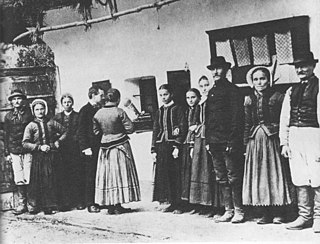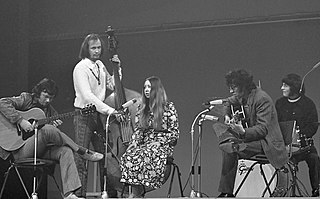Folk revival may refer to:
| This disambiguation page lists articles associated with the title Folk revival. If an internal link led you here, you may wish to change the link to point directly to the intended article. |
Folk revival may refer to:
| This disambiguation page lists articles associated with the title Folk revival. If an internal link led you here, you may wish to change the link to point directly to the intended article. |

Folk music includes traditional folk music and the genre that evolved from it during the 20th-century folk revival. Some types of folk music may be called world music. Traditional folk music has been defined in several ways: as music transmitted orally, music with unknown composers, or music performed by custom over a long period of time. It has been contrasted with commercial and classical styles. The term originated in the 19th century, but folk music extends beyond that.
Country rock is a subgenre of popular music, formed from the fusion of rock and country. It was developed by rock musicians who began to record country-flavored records in the late 1960s and early 1970s. These musicians recorded rock records using country themes, vocal styles, and additional instrumentation, most characteristically pedal steel guitars. Country rock began with artists like Bob Dylan, the Byrds, Nitty Gritty Dirt Band, the Flying Burrito Brothers, The International Submarine Band and others, reaching its greatest popularity in the 1970s with artists such as Emmylou Harris, the Eagles, Linda Ronstadt, Michael Nesmith, Poco and Pure Prairie League. Country rock also influenced artists in other genres, including the Band, the Grateful Dead, Creedence Clearwater Revival, the Rolling Stones, and George Harrison's solo work, as well as playing a part in the development of Southern rock.
Skiffle is a musical genre with influences from jazz, blues, and American folk music, generally performed with a mixture of manufactured and homemade or improvised instruments. Originating as a form in the United States in the first half of the 20th century, it became extremely popular in the UK in the 1950s, where it was associated with such artists as Lonnie Donegan, The Vipers Skiffle Group, Ken Colyer, and Chas McDevitt. Skiffle also played a major part in beginning the careers of prominent later jazz, pop, blues, folk, and rock musicians, The Beatles and Rory Gallagher amongst them. It has been seen as a critical stepping stone to the second British folk revival, the British blues boom, and British Invasion of the US popular music scene.
Folk rock is a hybrid music genre combining elements of folk music and rock music, which arose in the United States, Canada, and the United Kingdom in the mid-1960s. In the U.S., folk rock emerged from the folk music revival and the influence that the Beatles and other British Invasion bands had on members of that movement. Performers such as Bob Dylan and the Byrds—several of whose members had earlier played in folk ensembles—attempted to blend the sounds of rock with their pre-existing folk repertoire, adopting the use of electric instrumentation and drums in a way previously discouraged in the U.S. folk community. The term "folk rock" was initially used in the U.S. music press in June 1965 to describe the Byrds' music.
Country blues is one of the earliest forms of blues music. The mainly solo vocal with acoustic fingerstyle guitar accompaniment developed in the rural Southern United States in the early 1900s. Artists such as Blind Lemon Jefferson (Texas), Charley Patton (Mississippi), Blind Willie McTell (Georgia) were among the first to record blues songs in the 1920s. Country blues ran parallel to urban blues, which was popular in cities.
A roots revival is a trend which includes young performers popularizing the traditional musical styles of their ancestors. Often, roots revivals include an addition of newly composed songs with socially and politically aware lyrics, as well as a general modernization of the folk sound.

Throughout its history, the United Kingdom has been a major producer and source of musical creation, drawing its artistic basis from the history of the United Kingdom, from church music, Western culture and the ancient and traditional folk music and instrumentation of England, Scotland, Northern Ireland and Wales.
The term American folk music encompasses numerous music genres, variously known as traditional music, traditional folk music, contemporary folk music, or roots music. Many traditional songs have been sung within the same family or folk group for generations, and sometimes trace back to such origins as Great Britain, Europe, or Africa. Musician Mike Seeger once famously commented that the definition of American folk music is "...all the music that fits between the cracks."

The folk music of England is tradition-based music, which has existed since the later medieval period. It is often contrasted with courtly, classical and later commercial music. Folk music has been preserved and transmitted orally, through print and later through recordings. The term is used to refer to English traditional music and music composed, or delivered, in a traditional style. English folk music has produced or contributed to several important musical genres, including sea shanties, jigs, hornpipes and dance music, such as that used for Morris dancing. It can be seen as having distinct regional and local variations in content and style, particularly in areas more removed from the cultural and political centres of the English state, as in Northumbria, or the West Country. Cultural interchange and processes of migration mean that English folk music, although in many ways distinctive, has particularly interacted with the music of Scotland. It has also interacted with other musical traditions, particularly classical and rock music, influencing musical styles and producing musical fusions, such as British folk rock, folk punk and folk metal. There remains a flourishing sub-culture of English folk music, which continues to influence other genres and occasionally gains mainstream attention.
Roots music may refer to:
Roots rock is rock music that looks back to rock's origins in folk, blues and country music. It is particularly associated with the creation of hybrid subgenres from the later 1960s including country rock and Southern rock, which have been seen as responses to the perceived excesses of dominant psychedelic and developing progressive rock. Because roots music (Americana) is often used to mean folk and world musical forms, roots rock is sometimes used in a broad sense to describe any rock music that incorporates elements of this music. In the 1980s, roots rock enjoyed a revival in response to trends in punk rock, new wave and heavy metal music.
A folk club is a regular event, permanent venue, or section of a venue devoted to folk music and traditional music. Folk clubs were primarily an urban phenomenon of 1960s and 1970s Great Britain and Ireland, and vital to the second British folk revival, but continue today there and elsewhere. In America, as part of the American folk music revival, they played a key role not only in acoustic music, but in launching the careers of groups that later became rock and roll acts.
NorthSide is a record label based in Minneapolis, Minnesota that specializes in Nordic roots music. It is associated with Omnium Recordings and East Side Digital. Its president is Rob Simonds, one of the founders of Rykodisc.
Italian folk music has a deep and complex history. National unification came quite late to the Italian peninsula, so its many hundreds of separate cultures remained un-homogenized until quite recently compared to many other European countries. Moreover, Italian folk music reflects Italy's geographic position at the south of Europe and in the center of the Mediterranean Sea: Arabic, African, Celtic, Persian, and Slavic influences are readily apparent in the musical styles of the Italian regions. Italy's rough geography and the historic dominance of small city states has allowed quite diverse musical styles to coexist in close proximity.
Sing Out! was a quarterly journal of folk music and folk songs that was published from May 1950 through spring 2014.

The American folk music revival began during the 1940s and peaked in popularity in the mid-1960s. Its roots went earlier, and performers like Josh White, Burl Ives, Woody Guthrie, Lead Belly, Big Bill Broonzy, Richard Dyer-Bennet, Oscar Brand, Jean Ritchie, John Jacob Niles, Susan Reed, Paul Robeson and Cisco Houston had enjoyed a limited general popularity in the 1930s and 1940s. The revival brought forward styles of American folk music that had, in earlier times, contributed to the development of country and western, jazz, and rock and roll music.

Contemporary folk music refers to a wide variety of genres that emerged in the mid 20th century and afterwards which were associated with traditional folk music. Starting in the mid-20th century a new form of popular folk music evolved from traditional folk music. This process and period is called the (second) folk revival and reached a zenith in the 1960s. The most common name for this new form of music is also "folk music", but is often called "contemporary folk music" or "folk revival music" to make the distinction. The transition was somewhat centered in the US and is also called the American folk music revival. Fusion genres such as folk rock and others also evolved within this phenomenon. While contemporary folk music is a genre generally distinct from traditional folk music, it often shares the same English name, performers and venues as traditional folk music; even individual songs may be a blend of the two.
The British folk revival incorporates a number of movements for the collection, preservation and performance of folk music in the United Kingdom and related territories and countries, which had origins as early as the 18th century. It is particularly associated with two movements, usually referred to as the first and second revivals, respectively in the late 19th to early 20th centuries and the mid-20th century. The first included increased interest in and study of traditional folk music, the second was a part of the birth of contemporary folk music. These had a profound impact on the development of British classical music and in the creation of a "national" or "pastoral" school and led to the creation of a sub-culture of folk clubs and folk festivals as well as influential subgenres including progressive folk music and British folk rock.

Square Roots is a two- to three-day music festival that has been held each summer in the Lincoln Square neighborhood in Chicago since 1998. Organized by the Old Town School of Folk Music and the Lincoln Square Chamber of Commerce, the festival features world music and dance performances from a variety of genres with particular emphasis on folk and world music.